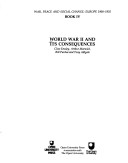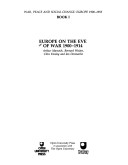War, peace & social change - Europe
4 total works
Between Two Wars
by John Golby, Bernard Waites, Geoffrey Warner, Tony Aldgate, and Tony Lentin
Published 1 May 1990
This book explores how much social change took place in western countries between the two world wars and whether such change was due to World War I or parliamentary processes. The central chapters provide a comparative study of three one-party dictatorships, Russia, Italy and Germany, after 1933 and ask how far it is true that the fascist and national socialist regimes were both born out of war and destroyed by war. The nature of "internal war" in Russia is examined. The book also questions whether "mass society" was something new and distinctive in the inter-war years and concludes with an analysis of World War II.
World War II and Its Consequences
by Professor Clive Emsley, etc., Arthur Marwick, Bill Purdue, and Tony Aldgate
Published 1 August 1990
In what ways did World War II differ from all previous wars including the World War I? Were genocide, strategic bombing and resistance movements peculiar features of this war? Examining these issues this book undertakes a discussion of the historical debate over the impact and consequences of World War II. It questions whether post-war social and economic reform was integrally related to the war, how far women were affected by this war as compared with World War I, and how the two world wars compare as, for instance, "watersheds" or in affecting the arts, literature, and intellectual and social attitudes generally? The book goes on to look at the geopolitical consequences of the war and the social developments which followed the war up to 1955.
War and Change in Twentieth Century Europe
by Arthur Marwick, Bernard Waites, Professor Clive Emsley, and John Golby
Published 1 September 1990
This book summarizes the main issues relating to war, peace and social change in 20th-century Europe. In the first section, on the nature and causes of war, it discusses how far total war differs from other kinds of war, what the relationships are between international war, civil war and internal war, and between war and revolution, and whether there were basic causes of war in the 20th-century or if the origins of the two wars were different. The next section is on the processes of change and asks whether long-term needs were such that the social developments of the 20th-century would have been much the same even if there had been no wars. The final section of the book summarizes and analyzes the debates over exactly what effects the two world wars have had on both geopolitical and social developments in the 20th century.
Europe on the Eve of War, 1900-14
by Arthur Marwick, Bernard Waites, Professor Clive Emsley, and Ian Donnachie
Published 1 March 1990
After identifying the main issues relating to war, peace and social change in the 20th century, this book establishes the nature of European society as it was on the eve of World War I. A discussion of the armed forces available to the different governments also raises the question of how far the different armies represented microcosms of their own societies. Industrial societies are contrasted with the less-developed ones, liberal democratic societies with autocratic ones, unitary national states with multi-national empires where the forces of nationality were potent forces of change. The book also analyzes the extent to which modernism and the main features of popular culture already existed before 1914, and how far the social changes characteristic of the 20th century were already discernable.


